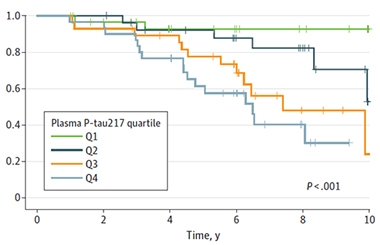Paper Alert: Plasma P-tau217 Predicts Future Cognitive Decline
Quick Links
At last year’s CTAD conference, Oskar Hansson and Niklas Mattsson-Carlgren of Sweden’s Lund University reported that, among 171 cognitively intact older adults from the Swedish BioFINDER-1 and American WRAP cohorts who tested positive for amyloid plaques, those with the most phosphotau-217 in their blood declined the fastest on the modified Preclinical Alzheimer Cognitive Composite and Mini-Mental State Exam over six years (Dec 2022 conference news). On February 6, the research was published in JAMA Neurology.

High P-tau, High Risk. As seen in this survival plot, 90 percent of amyloid-positive people who had little to no p-tau217 in their plasma (green) remained cognitively intact over a decade. Those in higher plasma p-tau217 quartiles developed AD dementia at progressively faster rates. Seventy percent of people in the highest quartile (blue) were diagnosed with AD in that time. [Courtesy of Mattsson-Carlgren et al., JAMA Neurology, 2023.]
First author Mattsson-Carlgren also determined the best combinations of blood biomarkers and demographics, including sex, APOE genotype, and years of education, to predict decline on the mPACC and MMSE. Plasma p-tau217, baseline mPACC scores, APOE4 status, and sex best foretold decline on the mPACC, while plasma p-tau217 and the cerebrospinal fluid Aβ42/40 ratio did so for the MMSE.
By itself, plasma p-tau217 was enough to flag those who would develop dementia. People with high plasma p-tau217 at baseline were twice as likely to progress to AD dementia within a decade as were those with low plasma p-tau217 (see image above).
The researchers calculated that adding plasma p-tau217 to clinical trial prescreening would slash sample size needed by 60 percent, offering a cheaper, minimally invasive way to find cognitively intact people most likely to decline.—Chelsea Weidman Burke
References
News Citations
Further Reading
No Available Further Reading
Primary Papers
- Mattsson-Carlgren N, Salvadó G, Ashton NJ, Tideman P, Stomrud E, Zetterberg H, Ossenkoppele R, Betthauser TJ, Cody KA, Jonaitis EM, Langhough R, Palmqvist S, Blennow K, Janelidze S, Johnson SC, Hansson O. Prediction of Longitudinal Cognitive Decline in Preclinical Alzheimer Disease Using Plasma Biomarkers. JAMA Neurol. 2023 Apr 1;80(4):360-369. PubMed.
Annotate
To make an annotation you must Login or Register.

Comments
No Available Comments
Make a Comment
To make a comment you must login or register.